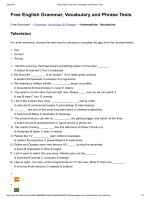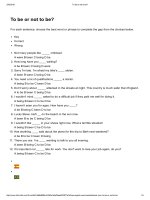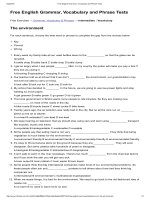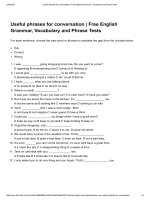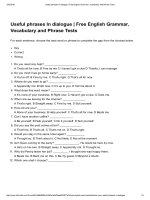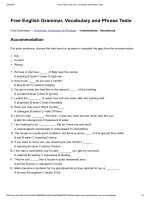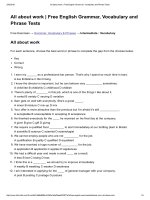Melvin jacqueline english grammar esl english grammar vocabu
Bạn đang xem bản rút gọn của tài liệu. Xem và tải ngay bản đầy đủ của tài liệu tại đây (1.06 MB, 262 trang )
GRAMMAR & VOCABULARY
Copyright © 2016 Jacqueline Melvin
All rights reserved. No part of this publication may be reproduced, stored in a
retrieval system, or transmitted in any form, electronic or by any other means,
photocopying, recording or otherwise, without prior written consent from the
author.
Table of Contents
Parts of speech
Sentence patterns
Correct word order
Who’s or whose
Who or whoever
Word formation one
Word formation two
Word formation three
Word formation four
Word formation five
Word formation six
Word formation seven
Word formation eight
Word formation nine
Word formation ten
Vocabulary quiz time
In the kitchen
Verbs quiz time
In the kitchen
Vocabulary quiz rime
Shopping-food and household products
Vocabulary and verb quiz time
The bathroom
Vocabulary quiz time
The living room
Verbs quiz time
The living room
Vocabulary quiz time
The bedroom
Verbs quiz time
The bedroom
Vocabulary quiz time
Clothes /jewellery/accessories
Vocabulary quiz time
Cars
Answers-who’s or whose
Answers-who or whoever
Answers-word formation one
Answers-word formation two
Answers-word formation three
Answers-word formation four
Answers-word formation five
Answers-word formation six
Answers-word formation seven
Answers-word formation eight
Answers-word formation nine
Scotland
Answers-word formation ten
Venice
How to increase your vocabulary
Gap fill exercise
Hoarding
Gap fill exercise-answers
Answers-vocabulary quiz time
The kitchen
Answers-verbs quiz time
The kitchen
Answers-vocabulary quiz time
Shopping/food and household products
Answers-vocabulary & verb quiz time
The bathroom
Answers-vocabulary quiz time
The living room
Answers-verbs quiz time
The living room
Answers-vocabulary quiz time
The bedroom
Answers-verbs quiz time
The bedroom
Answers-vocabulary quiz time
Clothes/jewellery and accessories
Answers-vocabulary quiz time
Cars
Grammar focus-proper nouns & adjectives
Answers
Making concise sentences
Answers
Gerunds
Answers
Grammar focus
Ed and ing adjectives
Answers
Grammar focus
Verbs and adjectives that look the same
Answers
Grammar focus-so or such
Answers
Grammar focus-echo questions
Answers
Grammar focus-question tags
Grammar focus-question tags-exercise
Answers
Agreeing and disagreeing
The future
To be going to + infinitive
To be going to
Exercise
Answers
Grammar focus
Other uses of going to
Grammar focus
Uses of will
Will or going to
Answers
Present continuous-future
The future-consolidation
Answers
Grammar focus
Present perfect
The present perfect
Unspecified time
Answers
Present perfect/for & since
Present perfect past to present exercise one
Answers
Present perfect past to present exercise two
Answers
Grammar focus
Present perfect continuous
The present perfect continuous exercise
Past to present
Answers
Grammar focus
Present perfect continuous
Exercise present perfect continuous
Answers
Past continuous
Past simple or past continuous exercise
Answers
Past perfect
Answers
Past perfect versus past simple
Answers
Past perfect
Just/yet/already/never
Answers
Past simple/past perfect/past perfect continuous
Answers
Grammar focus
Past perfect for past wishes and regrets
Answers
More uses of the past perfect
Answers
Grammar focus
The future perfect simple
Grammar focus
The future continuous
Grammar focus
Thefuture perfect continuous
Future consolidation
Answers
Grammar focus
The present simple passive
Present simple
Active to passive
Answers
Grammar focus
Past simple passive
Past simple active to passive
Answers
Grammar focus
Present continuous passive
Present continuous active to passive
Answers
Grammar focus
Perfect passives
Passive exercise
Defining & non defining relative clauses
Answers
Grammar focus
Used to/be used to/get used to
Reflexive
Used to/be used to/get used to
Answers
Adverbs
Answers
Avoiding repetition
Answers
Verbs which cause confusion
Answers
All tenses.questions/negatives/affirmatives
Answers
Key word transformation
Reporting verbs/direct to indirect one
Answers
Key word transformation
Reporting verbs/direct to indirect two
Answers
Conditionals
type 0, 1, 2 and 3
Answers
Key word transformations
Phrasal verbs
Answers
Introduction
This book is aimed at intermediate/early upper intermediate English language
students with its main focus on vocabulary building-an invaluable tool for
students who are studying for a forthcoming exam.
Correct sentence structure is also dealt with in the book. Learn how to form
longer sentences properly. Too many learners are writing in distorted English
due to a direct translation from their own language. Begin to become familiar
with sentence patterns to improve writing and speaking skills.
There are plenty of grammar exercises as well for those of you who like to
freshen up on grammar points.
Continuous revision is always a good idea at any level of English. It is all too
easy to forget if you do not practise. Practice makes perfect.
About the author
Jacqueline Melvin is a certified ESL teacher of English as a foreign language
having qualified with Cambridge RSA DELTA in 1997.
PARTS OF SPEECH
It is extremely beneficial to begin to familiarize yourself with the English
parts of speech. Having knowledge on basic grammatical terminology is a
key tool to sentence construction. Once you understand the function of each
part of speech and how they work together in sentences, then you are on your
way to recognising English sentence patterns. Soon you will understand what
sounds right and what doesn’t. These grammatical parts each play a role in
sentences, clauses and phrases. Some parts of speech have more than one
function, according to context, which you will learn as you progress in your
studies.
Remember! Good grammar begins with good organisation of words into
sentences.
In English there are nine parts of speech.
1. Articles
Indefinite articles A and An. We use A before nouns or adjectives + nouns,
which begin with a consonant or a consonant sound. The indefinite articles
are used when referring to anything indefinite (one of a kind).
Example
A man-one of many-(consonant)
A university (a vowel with a consonant sound)
The indefinite article An, is used before nouns or adjectives + nouns which
begin with a vowel (a,e,i,o,u) or a vowel sound.
Example
An apple
An honour (vowel sound-there is a silent ‘h’ in the word ‘honour’)
The definite article ‘the’ is used before nouns or adjectives + nouns to
specify something definite.
Example
I saw a girl with blonde hair. (One of a kind)
I saw the girl with the blonde hair who lives next door to me. (We specify
which girl-not one of many/of a kind but a specific one and we specified the
colour of hair)
2. Nouns
Nouns are the names we give to places, people and things.
Nouns are divided into common nouns and proper nouns.
Example
Boy, girl, fruit, flower etc. are all common nouns.
We also have common nouns which are abstract-that is, they cannot be seen
or felt. They are concepts or ideas.
Examples
Time, distance, speed, space, success, knowledge, love, hate are abstract
nouns.
Proper nouns are the names we give to people, places, titles etc.
Examples
John, Mary, New York, Italy, the Queen, the President etc. Proper nouns
must begin with a capital letter.
3. Pronouns
Pronouns take the place of nouns.
John is from England. He is English. ‘He’ is a pronoun-a subject pronoun
which substitutes the proper noun John.
I, you, he, she, it, we, you (plural) they-are all pronouns. They substitute the
noun and in most cases come before the verb.
Me, you, him, her, it, us, you, them are object pronouns. They come after the
verb.
Examples
John told Mary. He told her. ‘He’ substitutes the subject pronoun John, and
‘her’ substitutes the object pronoun Mary.
The girl is playing the piano. She is playing it.
My mother made pancakes. She is eating them.
4. Adjectives
Adjectives are describing words. They describe the noun. They usually
always come before the noun in English except when used with the verb ‘be’.
Example
A pretty girl-the adjective ‘pretty’ describes the noun ‘girl’.
An example of an adjective when used with the verb ‘be’.
The girl is pretty.
In English the adjective never varies according to number or gender.
My mother makes tasty pancakes. The adjective tasty describes the noun
pancakes.
What kind of pancakes does she make? She makes tasty pancakes.
The pancakes are big. They are also sweet.
Mother makes big, sweet, tasty pancakes. What kind of pancakes does mother
make?
Big, sweet, tasty ones.
We can add many adjectives before a noun. The order of the adjectives is
important. We cannot say for example, mother makes tasty, sweet, big
pancakes. This is the wrong order of the adjectives.
The order of adjectives
1) Opinion or fact
2) Size
3) Shape
4) Condition
5) Age
6) Colour
7) Nationality
8) Material
Example
A (8) woollen jumper.
A (7) Scottish (8) woollen jumper.
A (6) red, (7) Scottish (8) woollen jumper.
An (5) old, (6) red, (7) Scottish (8) woollen jumper.
A (4) scruffy, (5) old, (6) red, (7) Scottish (8) woollen jumper.
A (3) shapeless, (4) scruffy, (5) old, (6) red, (7) Scottish (8) woollen jumper.
A (2) large, (3) shapeless, (4) scruffy, (5) old, (6) red, (7) Scottish (8) woollen
jumper.
A (1) beautiful, (2) large, (3) shapeless, (4) scruffy, (5) old, (6) red, (7) Scottish (8)
woollen jumper.
Use commas to separate the adjectives except for the one closest to the noun.
When not to use commas
We do not use commas for adjectives which modify another adjective.
Example
A first class ticket. (First-used as an adjective-modifies-class and not ticket)
Note:
Although the word ‘first’ has the function of a noun, adjective or adverb, its
function, determined by context, is what determines its part of speech.
In the example of the jumper, the adjective ‘Scottish’ describes not only the
jumper but also the wool it is made from, therefore the comma is absent.
5. Verbs
A verb is a doing word. Verbs are used to indicate actions or states. Verbs are
the most important grammatical parts of speech. No sentence can exist
without a verb. The shortest complete sentence in the English language is
“Go”.
Examples of verbs-present tense
I am Mary. (A state of being)
I live in Liverpool. (A state/a fact)
I have a sister. (A state/a fact)
I play tennis every week. (An action)
6. Adverbs
Adverbs are used to describe verbs, other adverbs or adjectives. There are
different categories of adverbs which tell us how, why, where, when, how
often, how many times, to what extent/degree etc., that something is done.
Adverbs are a tricky part of the English language. There are so many
different kinds of adverbs, adverbial phrases and clauses and many adverbs
can be mistaken for prepositions. Adverbs cover a large range of uses
although their primary characteristic is to modify verbs thus the name ad +
verb = add to verb.
Adverbs of time answer the question when?
Yesterday I stayed at home.
I stayed at home yesterday.
I’m playing tennis tomorrow.
Adverb clauses and phrases of time normally come at the beginning or the
end of the clause. Do not put an adverb of time between the subject and the
verb.
I last Sunday saw you.
Last Sunday I saw you. I saw you last Sunday.
I’ll phone you soon. (Adverb)
I’ll phone you within the next hour. (Adverbial phrase)
The plane landed ten minutes ago. (Ten minutes ago is the adverbial phrase
which tells us when the plane landed).
I’ve done it again. (Again is an adverb of time which tells us that something
has been done before)
I get up early and I go to bed late. (Late and early are both adverbs and
adjectives)
Adverbs of manner answer the question how?
Many of these adverbs end in ‘ly’. They derive from adjectives.
Example
He’s a dangerous driver. (Adjective dangerous + noun ‘driver’)
He drives dangerously. (Adverb dangerously tells us how he drives). In what
manner does he drive? How does he drive? Dangerously.
She stood up suddenly. How did she stand up? Suddenly
Adverbs of manner usually come after the verb but sometimes they can come
before it.
She suddenly stood up.
She teased the boy playfully. She playfully teased the boy.
The adverb playfully derives from the adjective playful.
The children laughed (how?) happily.
The adverb happily derives from the adjective happy.


